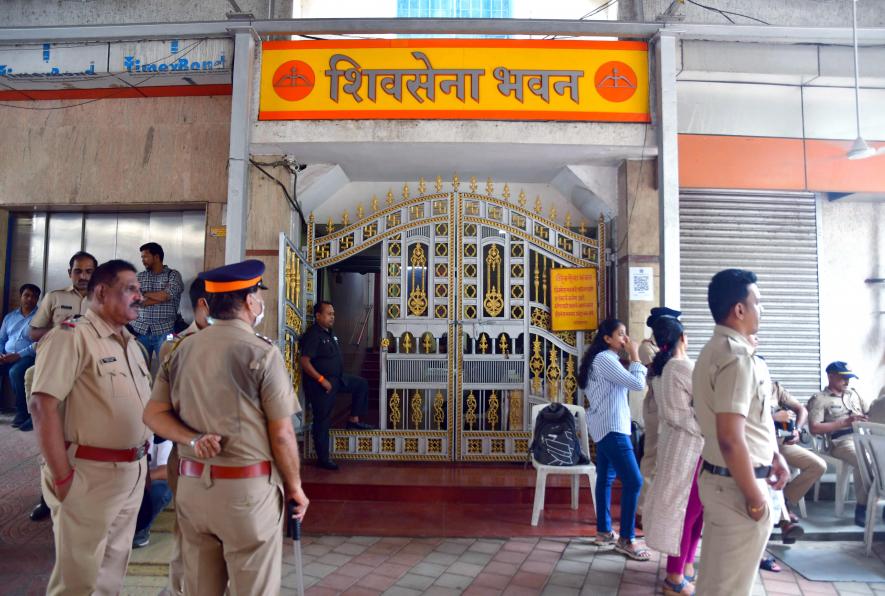Shiv Sena: Limits of Political Opportunism

After coming into existence in June 1966, the Shiv Sena, set up by cartoonist Balasaheb Thackeray, experienced electoral success for the first time when its candidates won a majority of seats in the Bombay (now Mumbai) Municipal Corporation, the wealthiest civic body of its kind in the country. The party's victory was aided by factionalism within the Congress on the issue of the creation of the new state of Maharashtra from the erstwhile Bombay Presidency province. It played an active role in the movement to include the Dharwar and Belgaum districts in Maharashtra and consolidated its base in Mumbai and adjoining industrial areas like Thane.
Through the late-1960s and the 1970s, the Shiv Sena was used by owners of textile mills to counter the influence of Left unions among workers. The Sena's strident rhetoric against non-Maharashtrian "outsiders," notably migrants from Uttar Pradesh, Bihar, and Tamil Nadu, and in favour of "sons of the soil" or Marathi manoos, divided textile industry workers and helped the party build a strong political base, especially in and around Greater Mumbai.
The 1980s onward, the public persona of the Sena became increasingly anti-Muslim. Balasaheb Thackeray proudly took credit for the fact that his sainiks were active participants in the demolition of the Babri Masjid in December 1992. He spewed venom on so-called Bangladeshi immigrants and was one of the few politicians on the planet who unabashedly expressed his great admiration for German dictator Adolf Hitler.
For around six years, between December 1995 and December 2001, Balasaheb Thackeray was disenfranchised (that is, barred from voting) after he was held guilty of delivering hateful speeches and writing articles considered communally incendiary. But the snarling tiger – the party's symbol – was not tamed.
After forming the state government in 1994 in alliance with the Bharatiya Janata Party, Shiv Sena spared no effort in preventing the smooth functioning of the BN Srikrishna commission of inquiry into the communal violence in Mumbai in December 1992 and January 1993 that was targeted largely at Muslims. The presentation of the commission's report was sought to be delayed, and, predictably, the Maharashtra government then, headed by Manohar Joshi, rejected its findings and recommendations, calling for punitive legal action against Shiv Sainiks.
When the Congress government led by Vilasrao Deshmukh threatened to arrest Balasaheb Thackeray, Shiv Sena ministers in the Atal Bihari Vajpayee government in Delhi, including Suresh Prabhu and Balasaheb Vikhe Patil, resigned. Balasaheb Thackeray was eventually not arrested, and the Sena continued to vie with the BJP, presenting itself as the more radical exponent of Hindutva among the alliance partners.
The Shiv Sena chief not only wanted India to send its forces to occupy Pakistan Occupied Kashmir but also wanted cricket matches between the two countries to be stopped. His supporters opposed a performance by popular ghazal singer Mehndi Hasan and attacked actor Dilip Kumar's residence when he received the highest civilian award from the government of Pakistan. The Sena's cultural policing also included imposing a "ban" on Mira Nair's film Fire for depicting a lesbian relationship.
Even as the Sena vied with BJP to expand its political support base across Maharashtra, the party faced internal dissensions that led to the departure of leaders like Sanjay Nirupam, Narayan Rane and Chhagan Bhujbal. The party was able to cut its losses after Balasaheb anointed his son Uddhav Thackeray and not his nephew Raj Thackeray, as his successor. Raj Thackeray went on to form his political output, the Maharashtra Navnirman Sena.
These instances of factionalism pale into relative insignificance when compared with the ongoing revolt in the party led by Eknath Shinde, spurred undoubtedly by the BJP led by former Chief Minister Devendra Fadnavis – who were never reconciled to the way Sharad Pawar outsmarted him and his supporters by forming a coalition government with the Sena, the Nationalist Congress Party and the Indian National Congress.
After becoming Chief Minister, Uddhav Thackeray made all the right noises. He said that politics and religion should be kept apart; not a single tree would be cut from the Aarey forest to build a railway shed; more than the bullet train to Ahmedabad, what Mumbai needed was an improvement in its suburban railway system. He painted an image of himself that was distinct from his father's.
But the Right-wing, communal, and parochial ideological glue that bound many Shiv Sainiks did not come unstuck quickly. Given the history of the Sena, the rebels are now portraying themselves as the "true" legatees of Balasaheb Thackeray, not his son Uddhav Thackeray. Opportunistic politics have reached its limits. The BJP was biding its time. With no shortage of resources, the ruling regime decided to move in for the kill with Shinde as a willing collaborator.
The writer is an independent journalist.
Get the latest reports & analysis with people's perspective on Protests, movements & deep analytical videos, discussions of the current affairs in your Telegram app. Subscribe to NewsClick's Telegram channel & get Real-Time updates on stories, as they get published on our website.























